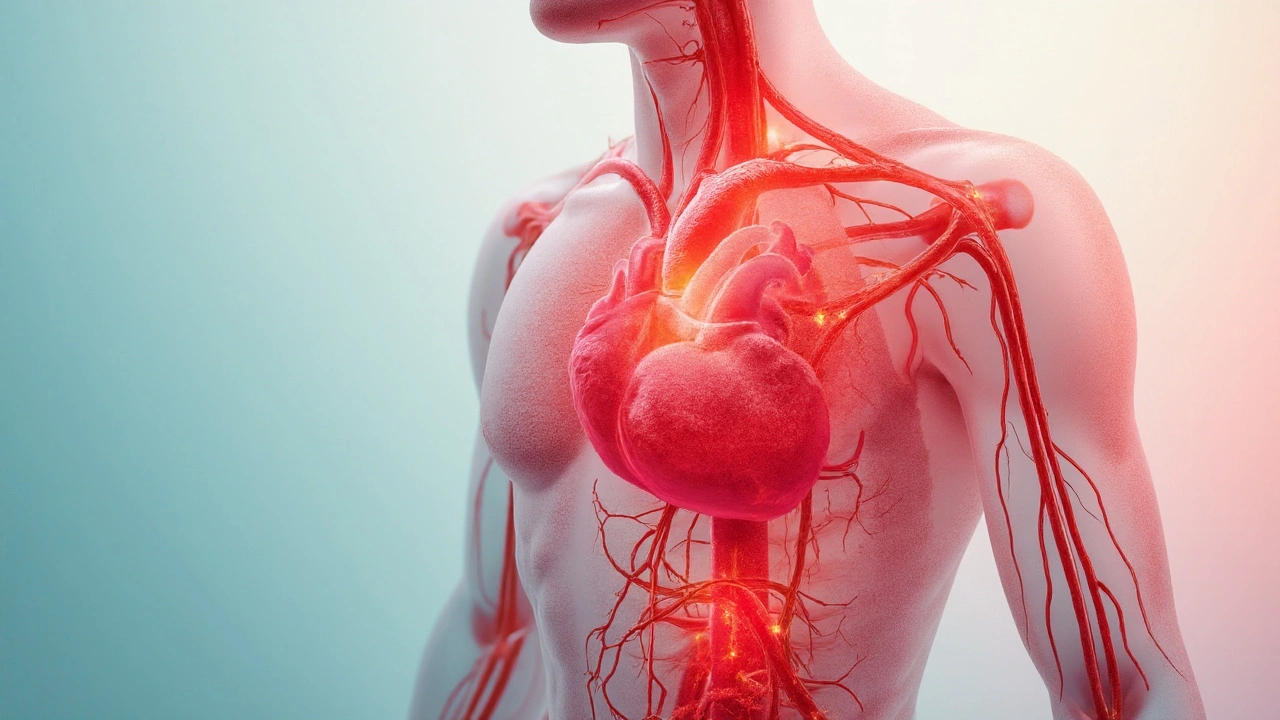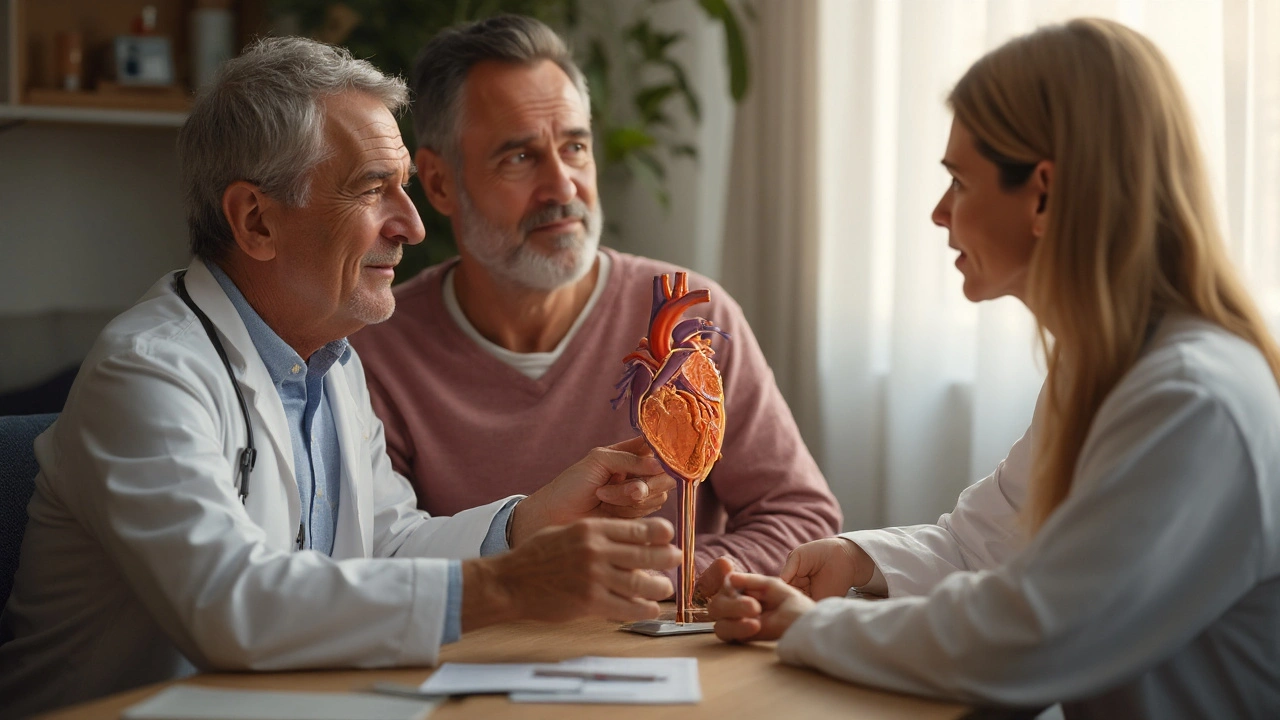Cardiovascular Risk Checker (CAD & ED)
When a man in his 50s complains about difficulty maintaining an erection, doctors often focus on the bedroom. But behind many cases of erectile dysfunction (ED) lies a silent threat to the heart. The coronary artery disease-ED connection isn’t a coincidence; both conditions stem from the same failing blood‑vessel system. Understanding that link can turn a private problem into a lifesaving early warning.
Key Takeaways
- CAD and ED share endothelial dysfunction and atherosclerosis.
- Typical risk factors-hypertension, diabetes, smoking-affect both equally.
- ED often appears years before a heart attack, serving as an early marker.
- Treating ED with PDE5 inhibitors can improve vascular health, but lifestyle changes remain essential.
- Men with new‑onset ED should be screened for silent CAD.
Coronary Artery Disease is a chronic condition in which plaque builds up inside the coronary arteries, narrowing the vessels that feed the heart muscle. Global prevalence sits around 125million adults, with mortality rates climbing to 17% in men over 65 (World Health Organization, 2023). The disease progresses silently; many patients feel fine until a heart attack or angina strikes.
Erectile Dysfunction is the persistent inability to achieve or maintain an erection sufficient for sexual activity. It affects roughly 30% of men aged 40‑70 (American Urological Association, 2022). While psychological stress can play a role, the majority of cases have a physiological root, most commonly reduced arterial inflow.
The Vascular Bridge: How Blood Vessels Connect Both Conditions
Both CAD and ED rely on smooth, unobstructed blood flow. Two key players-endothelial dysfunction and atherosclerosis-act as the shared culprits.
Endothelial cells line every artery and secrete nitric oxide, a molecule that relaxes smooth muscle and widens vessels. In both CAD and ED, chronic inflammation reduces nitric oxide production, leading to vasoconstriction.
As atherosclerotic plaques accumulate, they first narrow the smaller penile arteries (1-2mm) before the larger coronary arteries (3-4mm). This size hierarchy explains why ED often appears years before heart‑related symptoms.
Shared Risk Factors: The Usual Suspects
Several lifestyle and metabolic factors damage the endothelium simultaneously.
| Risk Factor | Effect on CAD | Effect on ED |
|---|---|---|
| Hypertension | Accelerates arterial stiffening | Reduces penile arterial compliance |
| Type2 Diabetes | Promotes glycation of vascular proteins | Impairs nitric oxide synthesis |
| Smoking | Induces oxidative stress, plaque growth | Damages endothelial cells, lowers NO |
| Dyslipidemia | Elevated LDL fuels plaque formation | LDL deposits in penile arteries |
| Obesity | Inflammatory cytokines increase plaque risk | Hormonal imbalance reduces libido and flow |
Notice how each factor hits both arteries in essentially the same way. That overlap turns ED into a “canary in the coal mine” for cardiovascular disease.

Clinical Implications: Why ED Should Trigger a Heart Check‑up
Guidelines from the American College of Cardiology (2024) recommend that any man under 60 with new‑onset ED receive a cardiovascular risk assessment-lipid profile, blood pressure, fasting glucose, and a resting ECG. Studies show that men with ED are 1.5‑fold more likely to develop CAD within the next five years.
Screening tools such as the Framingham Risk Score can quantify 10‑year cardiac risk. If the score is moderate‑to‑high, a stress test or coronary CT angiography may be warranted even if the patient feels fine.
Treatment Overlap: From PDE5 Inhibitors to Lifestyle Shifts
Phosphodiesterase type5 inhibitors (PDE5i) -including sildenafil, tadalafil, and vardenafil-work by preserving cyclic guanosine monophosphate (cGMP), the messenger that nitric oxide creates to relax smooth muscle. By boosting cGMP, PDE5i improve penile blood flow and, interestingly, also enhance coronary artery dilation.
Randomised trials (e.g., the IMPROVE‑CAD study, 2022) found that daily low‑dose tadalafil reduced arterial stiffness and improved endothelial function in men with both CAD and ED. However, PDE5i are not a substitute for risk‑factor control.
Comprehensive management should combine medication with proven lifestyle measures:
- Exercise ≥150minutes/week of moderate aerobic activity.
- Adopt a Mediterranean‑style diet rich in omega‑3 fatty acids, nuts, and leafy greens.
- Quit smoking; nicotine replacement or counselling can double success rates.
- Maintain a healthy weight (BMI<25kg/m²).
- Control blood pressure and glucose with diet, medication, and regular monitoring.
These steps not only improve erectile function but also slow or reverse coronary plaque progression.
Practical Checklist for Men and Their Doctors
- Ask your GP about a cardiovascular risk panel when ED first appears.
- Record blood pressure, fasting glucose, lipid panel, and waist circumference.
- Discuss any family history of heart attack or stroke.
- Consider a baseline stress test if you have multiple risk factors.
- Start a supervised exercise program; even 20‑minute walks help.
- Review medications-some antihypertensives (beta‑blockers) can worsen ED; alternatives may exist.
By treating the vascular system holistically, you protect both the heart and the bedroom.
Related Concepts and Next Steps
Understanding the CAD‑ED link opens doors to broader topics such as metabolic syndrome, stroke risk, and psychogenic factors. Readers who want to dive deeper might explore:
- How chronic inflammation drives atherosclerosis.
- The role of vascular endothelial growth factor in plaque stability.
- Impact of sleep apnea on both heart disease and erectile function.
Each of these areas reinforces the central message: vascular health is the common denominator.

Frequently Asked Questions
Can erectile dysfunction be the first sign of a heart problem?
Yes. Because the penile arteries are smaller, they often show plaque buildup before the coronary arteries. Men with new‑onset ED are up to 1.5times more likely to develop coronary artery disease within five years.
What tests should I ask for if I have erectile dysfunction?
Start with a full cardiovascular risk panel: lipid profile, fasting glucose, blood pressure, and a resting ECG. Depending on the results, a stress test or coronary CT angiogram may be recommended.
Do PDE5 inhibitors improve heart health?
Low‑dose daily PDE5i have been shown to reduce arterial stiffness and boost endothelial function, which can benefit heart health. However, they work best when combined with lifestyle changes and proper management of risk factors.
Is it safe to exercise if I have both CAD and ED?
Moderate aerobic activity (e.g., brisk walking, cycling) is recommended for nearly all men with CAD, provided they have physician clearance. Exercise improves both coronary blood flow and nitric oxide production, helping erectile function.
Can quitting smoking reverse erectile dysfunction?
Quitting smoking halts further endothelial damage and can improve nitric oxide levels within months. Many men report noticeable improvements in erection quality after 6‑12weeks of abstinence.
Should my partner be involved in the cardiovascular screening process?
Absolutely. Partners can help track symptoms, encourage healthy habits, and provide emotional support during medical appointments. Shared lifestyle changes often yield better outcomes for both parties.
Are there natural supplements that help both CAD and ED?
Omega‑3 fatty acids, L‑arginine, and beetroot juice have modest evidence for improving endothelial function. They should complement-not replace-prescribed medications and lifestyle strategies.








Uttam Patel
So ED is just a warning light? Cool. I thought it was just stress or too much porn.
peter richardson
Ive been ignoring my ED for years because i thought it was all in my head. Turns out my arteries are probably clogged like a drain full of grease. Time to see a doc.
Kirk Elifson
They want you to take pills so they can sell you more pills. Meanwhile the real fix is eating real food and walking. But nah lets just pump your body full of chemicals and call it a day.
Nolan Kiser
This is one of those rare cases where medicine actually connects the dots. ED isn't a sexual issue-it's a vascular emergency in slow motion. If you're over 45 and having trouble getting it up, get your cholesterol checked yesterday. No excuses.
Yaseen Muhammad
The vascular link is well-documented in peer-reviewed literature. Endothelial dysfunction precedes both conditions by an average of 2–3 years. Early detection through ED screening could reduce cardiovascular mortality by up to 20% in high-risk populations.
Dylan Kane
Wow so now my sex life is a heart attack waiting to happen? Great. Just what I needed to hear while trying to enjoy a quiet evening with my wife. Thanks for the guilt trip.
KC Liu
PDE5 inhibitors are a Big Pharma scam. The real cause of ED? Glyphosate in your food. The same chemical that’s destroying your gut and your arteries. They don’t want you to know this because it’s not patentable. Wake up.
Shanice Alethia
I’ve been telling my husband for YEARS that his ED wasn’t just "getting old". He said I was being dramatic. Now the science proves me right. I’m not mad, I’m just… vindicated. And honestly? Kinda proud.
Sam Tyler
I know this sounds overwhelming but hear me out. This isn’t about shame. It’s about awareness. If you’ve been avoiding the doctor because you think it’s embarrassing, think of it this way: your heart doesn’t care if you’re embarrassed-it just wants to keep beating. Start with one small change. Maybe swap soda for water. Or take a 10-minute walk after dinner. Progress, not perfection.
shridhar shanbhag
In India, we call this "dhat syndrome"-but it’s not just psychological. My uncle had ED at 52, ignored it, had a heart attack at 56. Now he walks 5km daily, eats roti with dal, and has more energy than me. Lifestyle matters more than pills.
John Dumproff
I used to think ED was something you just lived with. But after reading this, I realized it’s not a failure-it’s a signal. I’m not ashamed anymore. I’m going to talk to my doctor next week. Thanks for making me feel like I’m not alone.
Lugene Blair
You got this. I was in the same boat. Took me two years to say anything. But once I started walking, eating better, and actually talking to my wife about it? Everything changed. Not just the bedroom. My whole life. You’re not broken. You’re just overdue for a checkup.
William Cuthbertson
There’s something profoundly human here. We’ve been conditioned to treat the body as a collection of separate systems-heart here, sex there. But biology doesn’t work that way. The same blood that carries oxygen to your heart carries the spark of intimacy to your penis. To ignore one is to deny the unity of life itself. This isn’t medicine. It’s poetry written in arteries.
Eben Neppie
If you’re not getting screened for CAD after new-onset ED, you’re not just neglecting your health-you’re gambling with your life. The data is clear, the guidelines are explicit, and the cost of inaction is death. Stop waiting for a heart attack to wake you up.
Cosmas Opurum
This is all just Western propaganda. In Nigeria, we don’t need fancy scans or pills. We use herbs, prayer, and discipline. Your body is a temple, not a machine to be fixed by chemicals. The real problem? You’ve forgotten your roots. Eat real food. Walk barefoot. Pray. That’s how you heal.